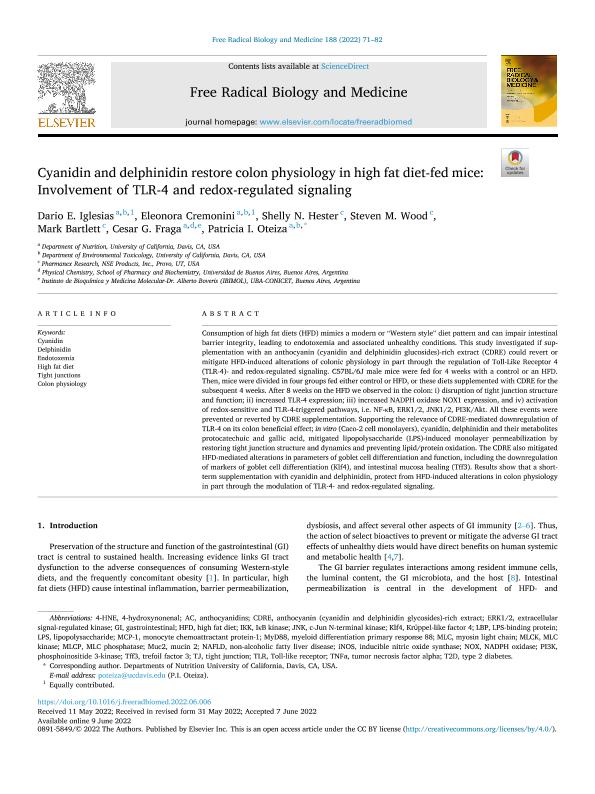Artículo
Cyanidin and delphinidin restore colon physiology in high fat diet-fed mice: Involvement of TLR-4 and redox-regulated signaling
Iglesias, Dario Ezequiel ; Cremonini, Eleonora; Hester, Shelly N.; Wood, Steven N.; Bartlett, Mark; Fraga, César Guillermo
; Cremonini, Eleonora; Hester, Shelly N.; Wood, Steven N.; Bartlett, Mark; Fraga, César Guillermo ; Oteiza, Patricia Isabel
; Oteiza, Patricia Isabel
 ; Cremonini, Eleonora; Hester, Shelly N.; Wood, Steven N.; Bartlett, Mark; Fraga, César Guillermo
; Cremonini, Eleonora; Hester, Shelly N.; Wood, Steven N.; Bartlett, Mark; Fraga, César Guillermo ; Oteiza, Patricia Isabel
; Oteiza, Patricia Isabel
Fecha de publicación:
06/2022
Editorial:
Elsevier Science Inc.
Revista:
Free Radical Biology and Medicine
ISSN:
0891-5849
Idioma:
Inglés
Tipo de recurso:
Artículo publicado
Clasificación temática:
Resumen
Consumption of high fat diets (HFD) mimics a modern or “Western style” diet pattern and can impair intestinal barrier integrity, leading to endotoxemia and associated unhealthy conditions. This study investigated if supplementation with an anthocyanin (cyanidin and delphinidin glucosides)-rich extract (CDRE) could revert or mitigate HFD-induced alterations of colonic physiology in part through the regulation of Toll-Like Receptor 4 (TLR-4)- and redox-regulated signaling. C57BL/6J male mice were fed for 4 weeks with a control or an HFD. Then, mice were divided in four groups fed either control or HFD, or these diets supplemented with CDRE for the subsequent 4 weeks. After 8 weeks on the HFD we observed in the colon: i) disruption of tight junction structure and function; ii) increased TLR-4 expression; iii) increased NADPH oxidase NOX1 expression, and iv) activation of redox-sensitive and TLR-4-triggered pathways, i.e. NF-κB, ERK1/2, JNK1/2, PI3K/Akt. All these events were prevented or reverted by CDRE supplementation. Supporting the relevance of CDRE-mediated downregulation of TLR-4 on its colon beneficial effect; in vitro (Caco-2 cell monolayers), cyanidin, delphinidin and their metabolites protocatechuic and gallic acid, mitigated lipopolysaccharide (LPS)-induced monolayer permeabilization by restoring tight junction structure and dynamics and preventing lipid/protein oxidation. The CDRE also mitigated HFD-mediated alterations in parameters of goblet cell differentiation and function, including the downregulation of markers of goblet cell differentiation (Klf4), and intestinal mucosa healing (Tff3). Results show that a short-term supplementation with cyanidin and delphinidin, protect from HFD-induced alterations in colon physiology in part through the modulation of TLR-4- and redox-regulated signaling.
Palabras clave:
CYANIDIN
,
DELPHINIDIN
,
ENDOTOXEMIA
,
HIGH FAT DIET
,
TIGHT JUNCTIONS
,
COLON PHYSIOLOGY
Archivos asociados
Licencia
Identificadores
Colecciones
Articulos(IBIMOL)
Articulos de INSTITUTO DE BIOQUIMICA Y MEDICINA MOLECULAR
Articulos de INSTITUTO DE BIOQUIMICA Y MEDICINA MOLECULAR
Citación
Iglesias, Dario Ezequiel; Cremonini, Eleonora; Hester, Shelly N.; Wood, Steven N.; Bartlett, Mark; et al.; Cyanidin and delphinidin restore colon physiology in high fat diet-fed mice: Involvement of TLR-4 and redox-regulated signaling; Elsevier Science Inc.; Free Radical Biology and Medicine; 188; 6-2022; 71-82
Compartir
Altmétricas



